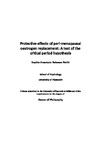Protective effects of peri-menopausal oestrogen replacement: A test of the critical period hypothesis
| dc.contributor.supervisor | Jacobs, Pam | |
| dc.contributor.author | Pettit, Sophie Anastasia Rebecca | |
| dc.contributor.other | Faculty of Science and Engineering | en_US |
| dc.date.accessioned | 2013-08-06T15:36:57Z | |
| dc.date.available | 2013-08-06T15:36:57Z | |
| dc.date.issued | 2013 | |
| dc.identifier | 287623 | en_US |
| dc.identifier.uri | http://hdl.handle.net/10026.1/1601 | |
| dc.description | Full version unavailable due to 3rd party copyright restrictions. | |
| dc.description | New director of studies: Prof Jackie Andrade | en_US |
| dc.description.abstract |
Oestrogen decline during the menopause leads to decline in cognitive performance because oestrogen receptor sites are found in the prefrontal cortex and hippocampus of the female brain, areas associated with memory and attention functions. Extensive research over the past two decades has tested the effects of administering Hormone Replacement Therapy (HRT) to maintain oestrogen levels. MRI studies have shown improvements in hippocampal volume and frontal functions with HRT, but evidence for associated improvements in verbal memory performance has been mixed. Some studies have even found detrimental effects of HRT, leading to the suggestion of a critical period for HRT administration relative to menopause. Oestrogen receptor sites are found in frontal brain regions associated with working memory (WM) functions including attention. These functions have been researched less than verbal memory, but with similarly mixed findings. The research reported in this thesis tested the critical period hypothesis in relation to WM. Study one tested the prediction that HRT will benefit WM if the therapy is initiated during the peri-menopause, and will harm it if initiated post-menopause. A naturalistic sample of 121 women were recruited, comprising women who varied in the time they had begun taking HRT, and menopausal status-matched controls who had never taken HRT. Participants completed three tests of WM span and the Sustained Attention to Response Task (SART) on two occasions 12 months apart. WM performance supported the critical period hypothesis, with women who had begun the therapy after the menopause displayed worsened WM capacity when compared to peri-menopausal initiators and post-menopausal women with no history of HRT use. At one year follow up, postmenopausal HRT users were still underperforming compared to peri-HRT initiators and those in the post-menopausal stage with no history of HRT use. No significant differences were identified between groups on the SART. The effects of natural supplements on physical symptoms of the menopause have been researched, but there is little research on their effects on cognitive symptoms and none specifically testing the critical period hypothesis. Study two tested the effects of soya isoflavones on WM during peri- and post-menopausal stages. One hundred and twelve peri- and post-menopausal women were randomly allocated to receive either placebo or 100mg soya supplement in capsules daily for three months. Participants and researcher were blind to this allocation. Participants completed two tests of WM span and two Sustained Attention (SA) tasks at baseline, after three months of soya/placebo, and after a further three months without supplement. There was no effect of isoflavones on cognition, regardless of time of initiation of the supplement. This thesis offers a unique contribution to the literature, by establishing empirically that HRT may have long-lasting benefits for WM if administered in the peri-menopause period, and detriments if taken post-menopause. There was no evidence that administration of soya-based phytoestrogens for three months peri- or post-menopause replicated these effects of HRT on cognition. | en_US |
| dc.language.iso | en | en_US |
| dc.publisher | University of Plymouth | en_US |
| dc.subject | Health Psychology | en_US |
| dc.subject | Critical period hypothesis | en_US |
| dc.subject | Hormone replacement | en_US |
| dc.subject | Executive function | en_US |
| dc.title | Protective effects of peri-menopausal oestrogen replacement: A test of the critical period hypothesis | en_US |
| dc.type | Thesis | |
| plymouth.version | Edited version | en_US |
| dc.identifier.doi | http://dx.doi.org/10.24382/1624 |
Files in this item
This item appears in the following Collection(s)
-
01 Research Theses Main Collection
Research Theses Main


